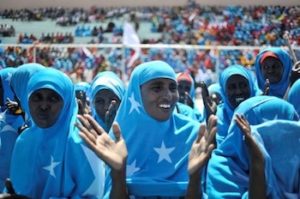
On this date in 1960, Somalia gained its independence from the United Kingdom. This repaired the invasion of the 1884 Berlin Conference, the high point of white European competition for territory in Africa, a process commonly known as the Scramble for Africa.
Situated in the horn of East Africa, early Somalia's economy was based upon the nomadic herding of animals. From the time of America’s Reconstruction (the 1870s) until World War II (1942), Britain gained control over the Italian portions of Somalia. In 1887, Britain became concerned about maintaining the route to India through the Suez Canal, which had been opened in 1869. As a result, Britain proclaimed Somalia a British protectorate, naming it British Somaliland.
At the beginning of the 20th century, native uprisings challenged British control. In 1910, the British abandoned the interior of Somaliland and withdrew to the coastal regions. Italy seized the opportunity to extend its control inland and overtook many areas that the British had abandoned. After World War II, Italy relinquished control, and Somalia was placed under the administration of the United Nations. It was a UN trust territory under Italian administration for ten years, until 1960, when Somalia was granted independence and merged with the former British protectorate, forming the Somali Republic.
Four years later, Somalia and Ethiopia fought over the Ogaden region. A civilian government ran the country for the first few years until General Muhammad Siad Barre's 1969 military coup. Siad Barre held power for more than two decades. He attempted to regain the territories the Somalis had lost over the years, including portions of Djibouti, Ethiopia, and Kenya, invading the Ogaden region in 1977. Two years later, a new constitution was passed into law, establishing a dictatorship with a single ruling political party.
While Siad Barre maintained his military dictatorship, foreign capital continued to flow into Somalia. The money came from aid from the International Monetary Fund (IMF) and individual countries as capital investment. Foreign aid often came in the form of loans, which led to massive foreign debt. Coupled with periods of severe drought, the debt soon made the economy unsustainable. The years of military dictatorship had disintegrated the social fabric of Somalia, and its people had no trust in the government.
During these years, under Reagan and Bush Sr., the United States provided General Siad Barre with more than $ 100 million annually. By the late 1980s, Somalia's economy had become unsustainable, and foreign aid, including that from the International Monetary Fund, was withdrawn. With the collapse of the Somali economy, civil unrest directed against the oppressive Barre regime began in the North. The Somali National Movement (SNM) initiated the activity, and for the next three years, various anti-government factions fought against Said Barre, until he fled the country in early 1991.
The collapse of the Siad Barre regime plunged Somalia into chaos, with many factions fighting to seize power. One of them, the United Somali Congress (USC), appointed a temporary president, which caused a civil war. Unarmed Jubba villagers starved, died, and fled by the hundreds of thousands, and Somalia’s river valleys became war zones.
In 1992, the UN Security Council mounted “Operation Restore Hope,” led by the U.S. By September 1993, the American Congress sought a way to withdraw from Somalia without losing credibility. The military forces would not withdraw until March 1995. During and after the civil war, many Somalis left the country. The United States government granted refugee status to many Somalis. The largest Somali population in the United States is in Minnesota.
Somali Cultural Association,
Somali History, May 2003
The World Book Encyclopedia. Copyright 200, World Book, Inc.
ISBN 0-7166-0096-X